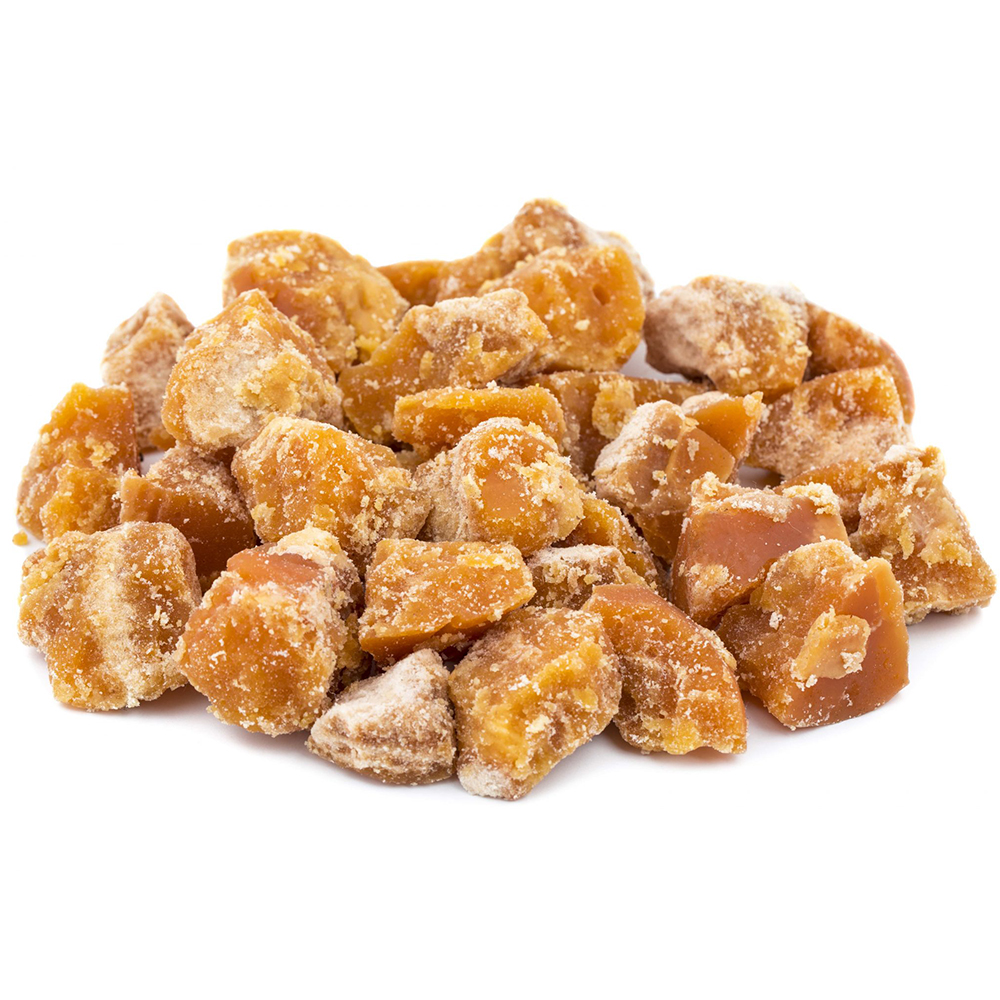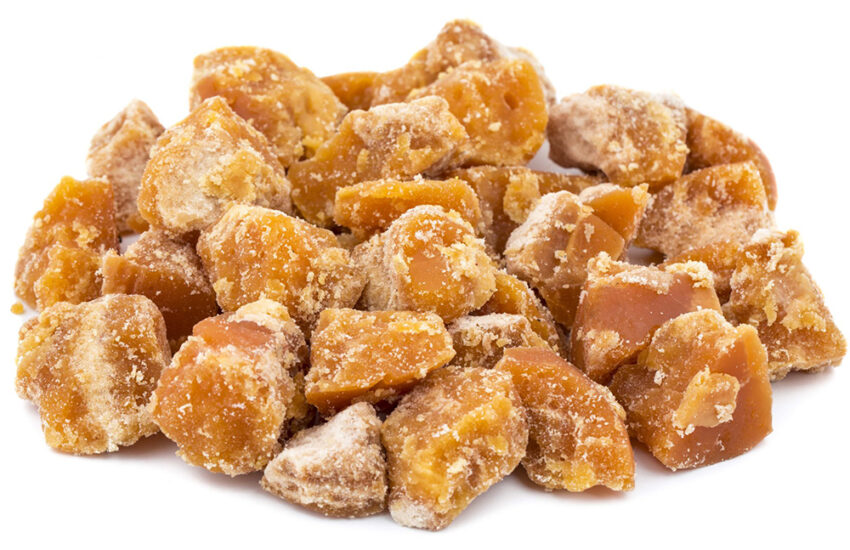Jaggery, a natural sweetener derived from concentrated sugarcane juice or palm sap, has been a staple in traditional diets for centuries. This unrefined sweetener is often considered a healthier alternative to refined sugar due to its unique nutritional profile and potential health benefits. In this comprehensive guide, Mohit Tandon from Burr Ridge will explore the diverse advantages of incorporating jaggery into your diet, examining its rich nutritional content, impact on various aspects of health, and how it compares to other sweeteners. Health Benefits of Eating Jaggery suggested by Mohit Tandon from Burr Ridge are as follows:

Nutritional Profile of Jaggery
Before delving into the health benefits, it’s essential to understand the nutritional composition of jaggery. While the exact nutritional content can vary based on the source (sugarcane or palm), jaggery generally contains:
1. Carbohydrates:
Firstly, Jaggery is primarily composed of carbohydrates, with sucrose being the dominant sugar. It also contains smaller amounts of fructose and glucose. The presence of these sugars provides a quick energy boost.
2. Vitamins and Minerals:
Jaggery is a source of various vitamins and minerals, including iron, magnesium, potassium, phosphorus, zinc, and vitamins such as B-complex vitamins (B1, B2, B3, B6). – Health Benefits of Eating Jaggery : Mohit Tandon Burr Ridge
3. Fiber:
Secondly, Jaggery contains dietary fiber, which is essential for digestive health. Fiber aids in maintaining regular bowel movements, preventing constipation, and supporting overall gastrointestinal function.
4. Antioxidants:
Thirdly, Jaggery contains antioxidants, including phenolic compounds and flavonoids. These antioxidants help neutralize free radicals, potentially reducing oxidative stress and inflammation in the body.
5. Iron:
Jaggery is a notable source of iron, a vital mineral involved in the production of hemoglobin and the prevention of iron-deficiency anemia. The iron in jaggery is non-heme iron, which may be more easily absorbed when consumed with vitamin C-rich foods. – Health Benefits of Eating Jaggery : Mohit Tandon Burr Ridge
6. Calcium:
Jaggery provides a modest amount of calcium, supporting bone health and various physiological processes in the body.
7. Phytochemicals:
Jaggery contains various phytochemicals, which are bioactive compounds found in plants. These compounds may contribute to the potential health benefits of jaggery.
Health Benefits of Eating Jaggery
1. Natural Sweetener with Lower Glycemic Index:
Jaggery has a lower glycemic index compared to refined sugar, meaning it causes a slower and steadier rise in blood sugar levels. This can be particularly beneficial for individuals with diabetes or those aiming to manage their blood sugar levels. Health Benefits of Eating Jaggery : Mohit Tandon Burr Ridge
2. Rich Source of Iron:
Iron deficiency is a common nutritional concern, especially among women and children. Jaggery, being a good source of iron, can contribute to the prevention and treatment of iron-deficiency anemia.
3. Digestive Health:
The dietary fiber in jaggery aids in digestion by promoting regular bowel movements and preventing constipation. It also helps in cleansing the digestive system.
4. Respiratory Health:
In traditional medicine, jaggery is sometimes used to alleviate respiratory issues. It is believed to help with conditions like asthma and bronchitis, although more research is needed to substantiate these claims.
5. Nutrient Absorption:
The presence of certain vitamins and minerals in jaggery, such as vitamin C and iron, can potentially enhance the absorption of non-heme iron. Consuming jaggery with vitamin C-rich foods may boost iron absorption.
6. Energy Boost:
Jaggery provides a quick and easily digestible source of energy due to its carbohydrate content. This can be beneficial for individuals engaged in physical activities or those needing a natural energy boost.
7. Antioxidant Properties:
The antioxidants in jaggery, including phenolic compounds and flavonoids, contribute to its potential protective effects against oxidative stress. Mohit Tandon from Burr Ridge says that Antioxidants help neutralize free radicals and reduce inflammation in the body.
8. Menstrual Health:
Jaggery is often recommended in traditional medicine to address menstrual symptoms. It is believed to help alleviate cramps and provide a natural source of iron for women during their menstrual periods.
9. Bone Health:
The modest calcium content in jaggery contributes to bone health. While it may not be a primary source of calcium, every bit adds up to the overall intake, supporting bone density and strength.
10. Immune System Support:
The vitamins and minerals present in jaggery, including vitamin C, iron, and zinc, play roles in supporting immune function. Adequate intake of these nutrients is essential for a robust immune system.
11. Anemia Prevention and Treatment:
Due to its iron content, jaggery can be beneficial in preventing and treating iron-deficiency anemia. It is particularly valuable for individuals who may have difficulty obtaining iron from other dietary sources.
12. Detoxification:
Jaggery is believed to have detoxifying properties, helping cleanse the liver by aiding in the removal of toxins from the body. The antioxidants in jaggery contribute to its potential detoxification effects.
13. Regulation of Blood Pressure:
The potassium content in jaggery may contribute to blood pressure regulation. Potassium is known for its vasodilatory effects, helping relax blood vessels and potentially reducing hypertension.
14. Anti-Inflammatory Effects:
The phytochemicals and antioxidants in jaggery may exhibit anti-inflammatory properties, contributing to the reduction of inflammation in the body. Chronic inflammation is associated with various health issues, including cardiovascular diseases and certain chronic conditions.
15. Weight Management:
As a natural sweetener with some nutritional value, jaggery may be a better choice for those aiming to manage their weight. Its fiber content contributes to a feeling of fullness, potentially reducing overall calorie intake.
How to Incorporate Jaggery into Your Diet
1. Jaggery Tea or Coffee:
Add a small piece of jaggery to your tea or coffee as a natural sweetener. The rich, caramel-like flavor of jaggery can enhance the taste of your hot beverages.
2. Jaggery in Desserts:
Use jaggery as a sweetener in desserts such as puddings, cakes, and cookies. It can impart a unique and rich flavor to your sweet treats.
3. Jaggery Chutney or Sauces:
Prepare chutneys or sauces using jaggery to accompany savory dishes. Jaggery chutney can add a sweet and tangy element to your meals.
4. Jaggery Ladoos or Energy Bites:
Make traditional Indian sweets like jaggery ladoos or energy bites. Combine jaggery with nuts, seeds, and other nutritious ingredients to create delicious and energizing snacks.
5. Jaggery in Curries:
Incorporate jaggery into savory dishes, especially in traditional Indian curries. It can balance the flavors and add a subtle sweetness to the dish.
6. Jaggery Drinks:
Prepare refreshing drinks by dissolving jaggery in water and adding a squeeze of lemon or a dash of ginger. This natural beverage can be a healthier alternative to sugary drinks.
7. Jaggery with Fruits:
Enjoy jaggery with fruits like bananas, papayas, or apples. The combination of natural sugars from fruits and the distinct sweetness of jaggery can create a delightful and nutritious snack.
8. Jaggery Toppings:
Drizzle melted jaggery over pancakes, waffles, or oatmeal for a natural and wholesome sweet topping.
9. Jaggery Candy:
Make jaggery candy by melting and molding it into small, bite-sized pieces. This can serve as a healthier alternative to conventional candies.
10. Jaggery Smoothies:
Blend jaggery with fruits, yogurt, and ice to create nutrient-rich smoothies. This is a delicious way to incorporate jaggery into your daily routine.
Considerations and Precautions
While jaggery offers numerous health benefits, it’s important to consume it in moderation. Here are some considerations and precautions:
1. Moderation is Key:
Jaggery, like any sweetener, should be consumed in moderation. While it provides certain nutrients, excessive intake can contribute to an increased calorie and sugar intake.
2. Blood Sugar Levels:
While jaggery has a lower glycemic index compared to refined sugar, individuals with diabetes should still monitor their blood sugar levels and consult with healthcare professionals to determine appropriate portions.
3. Dental Health:
Jaggery, like other sweeteners, can contribute to dental issues if consumed excessively. Practice good oral hygiene and limit the frequency of consuming sugary foods, including jaggery.

4. Source and Quality:
Choose high-quality jaggery from reputable sources to ensure its purity and minimize the risk of contaminants. Be cautious of additives or adulterants sometimes present in commercially available jaggery products.
5. Allergies:
Individuals with allergies to sugarcane or palm products should exercise caution when consuming jaggery. If allergic reactions occur, discontinue use and seek medical advice.
6. Interaction with Medications:
If you are taking medications, especially those related to blood sugar regulation or iron supplementation, consult with your healthcare provider before incorporating jaggery into your diet.
7. Pregnancy and Lactation:
Pregnant and lactating women can benefit from the iron and other nutrients in jaggery, but it’s advisable to consult with a healthcare professional to determine appropriate intake levels.
8. Individual Tolerance:
Each person’s response to jaggery can vary. Some individuals may tolerate it well, while others may experience digestive discomfort. Pay attention to your body’s response and adjust consumption accordingly.
Conclusion
Jaggery, with its rich nutritional profile and potential health benefits, can be a valuable addition to a balanced and varied diet. Its natural sweetness, coupled with essential vitamins and minerals, sets it apart as a healthier alternative to refined sugar. From supporting digestive health to providing iron and antioxidants, jaggery offers a range of advantages.
Lastly, Incorporate jaggery into your diet mindfully, considering your individual health status, dietary needs, and personal preferences. Whether used as a sweetener, a natural remedy, or an ingredient in culinary creations, jaggery stands as a versatile and wholesome addition to the spectrum of natural sweeteners available. As with any dietary choice, it’s advisable to seek guidance from healthcare professionals, especially if you have specific health concerns or conditions that may influence your dietary decisions. Embrace the goodness of jaggery in moderation and savor both its taste and potential health benefits as part of a well-rounded lifestyle.
